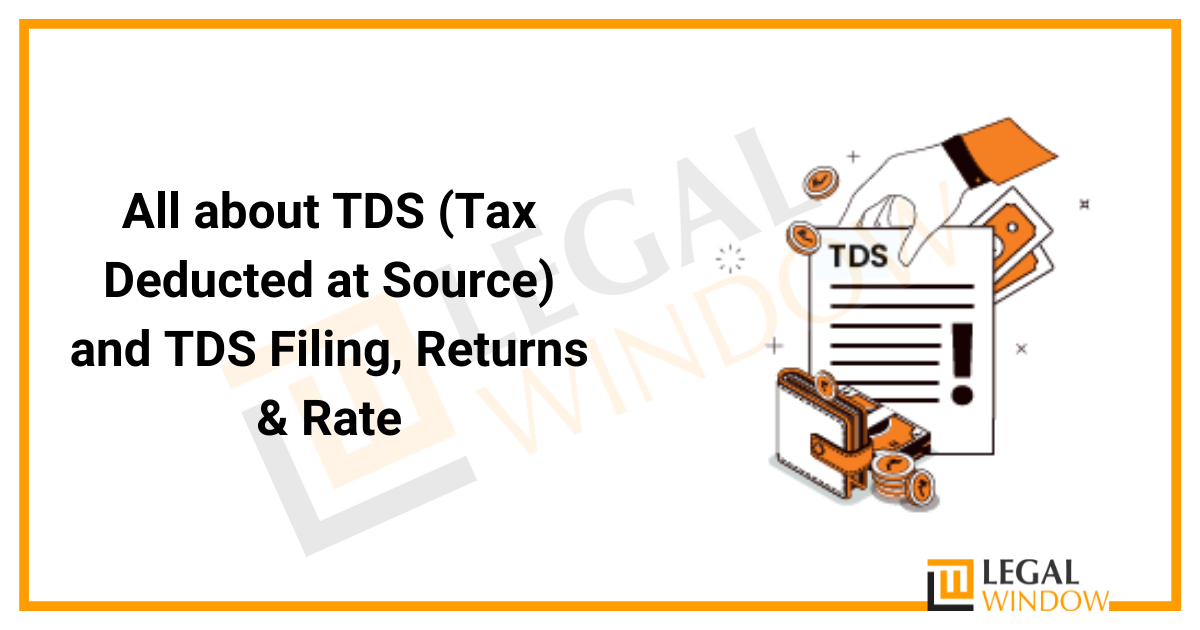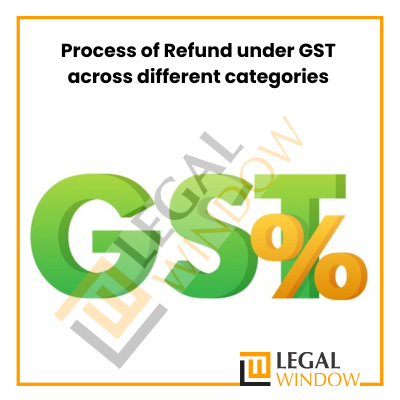All about TDS (Tax Deducted at Source) and TDS Filing, Returns & Rate
- February 28, 2022
- Income Tax

TDS was created with the goal of collecting tax directly from the source of revenue. According to this notion, a person (deductor) who is required to make a payment of a certain sort to another person (deductee) must deduct tax at source and send it to the Central Government’s account. On the basis of Form 26AS or TDS certificate given by the deductor, the deductee whose income tax has been deducted at source is entitled to a credit for the amount thus deducted. All about Tax Deducted at Source is briefly described in the article below.
All about Tax Deducted at Source – Meaning
TDS (Tax Deducted at Source) is a percentage of a payment that is deducted when it is made, such as a salary, commission, rent, interest, professional fees, and so on. The individual who makes the payment deducts tax at source, whereas the one who gets the payment/income owes tax. It reduces tax avoidance because the tax is collected when the payment is made.
All about Tax Deducted at Source- When and by whom it is deducted?
- TDS will be deducted at the time of any payment that falls under the Income Tax Act’s definition.
- If you are a person or a Hindu Undivided Family (HUF), no TDS will be deducted, and your books will not be audited.
- Even if your books are not subject to a tax audit, a TDS of 5% will be taken if you pay rent as an individual or as a member of a HUF and the amount payable exceeds Rs.50, 000.
- If you need to have TDS deducted at a rate of 5%, you will not be required to apply for a Tax Deduction Account Number (TAN).
- If you are employed, your employer will deduct TDS according to the applicable income tax slab rates.
- TDS will be deducted at a rate of 10% by the bank with whom you have a working account. TDS at a rate of 20% will be deducted if they do not have your PAN details.
- TDS rates are set under the Income Tax Act for the majority of payments, and the payer deducts TDS according to the rates.
- If you present your investment proofs to your employer and your total taxable income is less than the total taxable threshold, you will not be obliged to pay any tax. As a result, no TDS will be deducted in this situation.
- If your total taxable income is less than the total taxable limit, you can also submit Form 15G and Form 15H to the bank. In this instance, the bank will not collect any TDS from your interest earnings.
- If you neglected to present your employer with the investment proof and the bank deducted the TDS, you can file a return and get a refund if your total taxable income is less than the total taxable limit.
Example of Tax Deducted at Source
Assume that a startup company pays whoever owns the property Rs.90,000 in rent per month. Because the TDS on the sum is 10%, the company must deduct Rs.9,000 from the total and give Rs.81,000 to the property owner. Following TDS, the property owner will earn Rs.81,000 in this situation. The owner can deduct the Rs.9,000 that the company has already deducted from his income by adding the gross amount of Rs.90,000 to his income.
Tax Deduction at Source Rate on Salary
While making the real payment to the employee, any employer has the ability to deduct tax at source. Employers only deduct tax from salaries when they are paid. If the employee’s whole income is taxable, TDS is deducted. If your total income is less than Rs. 2,50,000, TDS will not be deducted. This sum applies to both men and women under the age of 60. TDS is normally deducted at a rate ranging from 10% to 30% of a person’s wage.
| Income Slabs | Tax Rates |
| Up to Rs. 3,00,000 | NIL |
| Rs. 3,00,000 – Rs. 5,00,000 | 10% |
| Rs. 5,00,000 – Rs. 10,00,000 | 20% |
| Above Rs. 10,00,000 | 30% |
For Senior Citizens
| Income Slab | Tax Rate |
| Up to Rs. 5,00,000 | NIL |
| Rs. 5,00,000 – Rs. 10,00,000 | 20% |
| Above Rs. 10,00,000 | 30% |
Procedure for filing Tax Deducted at Source Online
There are a few things you must make sure of before filing your TDS return. The following are the details:
- Make sure you have a valid Tax Deduction and Collection Account Number (TAN) for e-filing.
- Use the Return Preparation Utility to prepare your TDS statements before verifying them using the File Validation Utility.
- If you want to use DSC to upload your returns, you must have a valid Digital Signature Certificate that has registeration for e-Filing.
- For uploading your returns using e-Verification Code, provide the demat or bank account data of your principal contact, or make sure his/ her PAN is in link with his/her Aadhaar.
Fine for late payment of Tax Deducted at Source
For failure to submit or defaults in filing your TDS return/statements, the Income Tax Department imposes the following penalties:
- Failure to file returns: A penalty of Rs.100 will be impose under Section 272A (2) of the Income Tax Act for each day that the returns are not fill up, up to the TDS amount.
- Failure to file your returns on time: A penalty of Rs.200 will be impose under Section 234E of the Income Tax Act for each day that the returns remain unfilled, up to the TDS amount.
- If the deductor fails to file the TDS return by last date, a penalty of Rs.10,000 to Rs.1 lakh would be impose under Section 271H of the Income Tax Act.
- If the deductor provides false information pertaining to PAN, TDS amount, etc. A penalty of Rs.10,000 to Rs.1 lakh will be impose under Section 271H of the Income Tax Act.
- Non-payment of TDS: If taxpayer do not pay TDS by due date, then interest will be assess along with the penalty.
- If a portion or all the tax is not deducted at source, interest of 1.5 percent per month will be assessed from the day the tax was deductible until the date the tax is actually deducted.
How can we claim Tax Deducted at Source
Individuals can apply for a TDS refund on the IRS website. However, Income Tax Returns taxpayer must file, as well as the TDS refund. The Income Tax Department will process TDS after the taxpayer will file the ITR. Bank will credit the amount within 6 months. Individuals can also check the status of their refund on the Internal Revenue Service’s official website.
Certificate of TDS
There are two forms of TDS certificates: Form 16 and Form 16A. The deductee should receive a certificate from the department under Section 203 of the Income Tax Act, 1961. This form must be provided to the deductee by the deductor.
- Employers must furnish Form 16 to salaried employees, which must provide a breakdown of the amount deducted as TDS. The computation of tax, the deduction of tax, and the payment of TDS are all included in Form 16. Employers should provide this form to their employees by May 31 of the next fiscal year.
- For non-salaried class: The deductor gives the Form 16A, which consist of the information regarding computation, TDS deduction, and payments.
Merits of TDS
- It prevents people from avoiding paying their taxes.
- TDS provides the government with a consistent source of revenue.
- It is more convenient for the deductee because the tax amount due is deducted automatically.
Takeaway
The phenomenon of TDS is for the purpose to reduce the chance of evasion by the recipient of the income. Moreover, transparency in the economy of the country can also be increase.
Tax Deducted at source helps in reducing the burden of filing tax for a deductee. It makes sure that the Government will receive stable revenues for the taxpayers.
Hope this article is successful in explaining All about Tax Deducted at Source. For more details about this topic kindly connect to our experts.
LegalWindow.in is a professional technology driven platform of multidisciplined experts like CA/CS/Lawyers spanning with an aim to provide concrete solution to individuals, start-ups and other business organisation by maximising their growth at an affordable cost. Our team offers expertise solutions in various fields that include Corporate Laws, Direct Taxations, GST Matters, IP Registrations and other Legal Affairs.
Categories
- Agreement Drafting (23)
- Annual Compliance (11)
- Change in Business (36)
- Company Law (147)
- Compliance (88)
- Digital Banking (3)
- Drug License (3)
- FEMA (17)
- Finance Company (42)
- Foreign Taxation (6)
- FSSAI License/Registration (14)
- GST (116)
- Hallmark Registration (1)
- Income Tax (199)
- Latest News (34)
- Miscellaneous (164)
- NBFC Registration (8)
- NGO (14)
- SEBI Registration (6)
- Section 8 Company (7)
- Start and manage a business (20)
- Startup/ Registration (126)
- Trademark Registration/IPR (40)
Recent Posts
About us
LegalWindow.in is a professional technology driven platform of multidisciplined experts like CA/CS/Lawyers spanning with an aim to provide concrete solution to individuals, start-ups and other business organisation by maximising their growth at an affordable cost.








